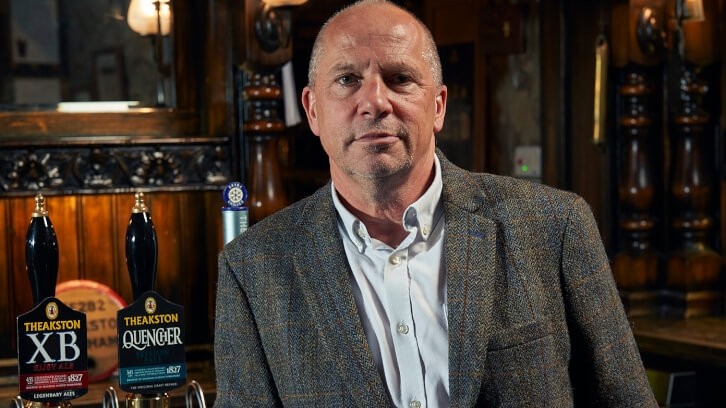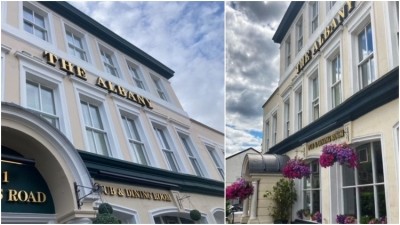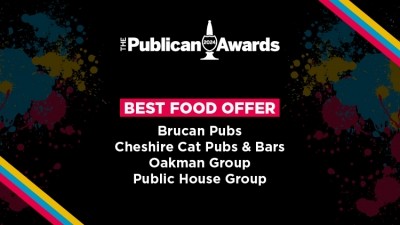BIG INTERVIEW
The Big Interview: 'I don’t want to sound trite, but I must be incredibly lucky'

Richard Bradbury, managing director at Theakston’s brewery, told the Morning Advertiser the family values he abides by have helped him succeed in his career and were instilled in him by his parents, who, though not from a brewing background, he described as “real grafters”.
Born and raised in Birmingham, Bradbury’s father was a newspaper editor working in regional press and his mother was a full-time district nurse, but respect for others and a strong community focus is a “common strand” he has taken with him working in the sector.
And these core values, he said, have been crucial in helping him build and lead strong teams throughout his career and get long-term results.
“Having respect for everybody who work in the industry, whatever role they do, that's really important to me.
“Understanding your own strengths and weaknesses and building teams of people around you that complement you is crucial.
“I'm a big believer in focusing on and playing to people's strengths. If you get people using their strengths, then you can afford to worry less about people's individual weaknesses.
“We will have weaknesses. It's just how we complement each other.”
While the firm’s chair and executive director, Simon Theakston, jokingly describes the Yorkshire-based brewery as being “infiltrated by the Midland’s Mafia”, with many members of team from the region, Bradbury said he felt very lucky to work with a family-led firm.
Longer-term perspective
“I’m very lucky to work closely with Simon, we very much work collaboratively and take the opportunity to talk things through a lot.
“We have quite complementary outlooks and skills, they're different, but that actually helps. We're able to talk through the challenges and the decisions.
“Having that family influence gives the business a longer-term perspective with more focus around building quality brands and not making the wrong short-term decisions to the detriment of the medium and long-term.”
Lucky is a word Bradbury uses often during our conversation to depict his career, which started almost four decades ago.
“I don’t want to sound trite, but I must be incredibly lucky because, I don't think I've had any prolonged low periods or anything that I've found has been really negative.”
After leaving Cambridge University, where he studied economics, Bradbury began working at Wolverhampton and Dudley Breweries, now Marston's group, in 1986 as a graduate trainee.
While he said his time there “knocked any airs and graces” out and was quite different from the environment at university, he added it was an “invaluable” learning experience.
“I got to know and understand every part of the business working in the brewery, from tech services to running pubs, and then morphed out of that into a sales role and worked in the free trade team.”
Bradbury worked in this area of the business for another four years before moving onto other roles and eventually left in 1998 as free trade director to join Heineken, where he worked for a further four years leading the brewers’ Irish sales team.
“I love the social interaction, the time in the pubs and the commercial challenges of bringing beer to market and building brands.”
Following this, the managing director then moved back to the UK, playing a crucial role in Heineken’s UK brand relaunch in the early 2000’s, eventually working his way up to commercial director roles before joining Theakston as managing director in 2020.
“I didn't particularly know what I wanted to do when I left university, during what was quite a high time for unemployment rates in the UK, and suddenly came into the brewing industry and found it just absolutely ticked all my boxes.
“The thing I really like about hospitality is that lots of people join the industry, like myself, and just fall in love with it, you can build up such a huge network of people in different companies and roles, and that always stays with you.”
His time spent at Heineken and being instrumental in the rebrand, which included bringing names such as Amstel and Moretti to the UK, was a period he looked back on particularly fondly.
“Going on to see how well those products have done, pretty much in the same brand positioning over the last 20 odd years, I take a lot of pride from that.
“As I've moved through my career, I have also taken pride from seeing how people who have been part of teams I've worked on in the past have gone on to excel in their careers in different roles.
“The people in the industry and the nature of hospitality make it a very supportive industry. There's a nice balance between that highly competitive element and mutual support.
“I love the social interaction, the time in the pubs and the commercial challenges of bringing beer to market and building brands.”
Though seeing Theakston’s do so well in a challenging market has “every potential to become a career highlight also”, Bradbury added.
Having worked in leadership roles for more than 30-years, the managing director said he was not surprised by the task in hand at Theakston’s but felt a “big sense of responsibility” heading up a family business with such longevity.
Challenging times
“Theakston is a 197-year-old family firm, to be given the trust to run a business with such a long pedigree is an honour, but I feel a huge sense of responsibility to the family, our employees, customers and to suppliers to do a good job.
“The brewing industry has seen challenging times coming out of Covid, and that sense of responsibility to do a good job for the company to navigate all the challenges that have been thrown our way over the last few years and to come out the other side positively, that's probably what I feel the most.”
This, Bradbury continued, was where he felt the most pressure from in his role.
“I'm somebody who doesn't spend a lot of time wallowing. In the past I've been very lucky. I absolutely love the industry.
“But I've probably put myself under more pressure than any boss or any circumstance has ever done.
“I have a lot of inbuilt self-drive. I'm very competitive and I think that competitive nature and desire to do a good job comes from within, and probably from my parents and the values they instilled in me.”
However, the industry stalwart explained he has always used this pressure to deal with any negative circumstances and see them as an opportunity to “turn it around”.
“Like any person in any job, you get the odd bad day, but I don't let bad days transcend themselves into longer periods of time.
“I tend to be someone who's very focused on problem solving, so if something comes in as a negative, I'll pretty quickly move to thinking about how I'm going to solve it and how I'm going to turn it around and actually I quite like the challenge of that. That helps keep me positive.
“I try and depersonalise it and look at the problem itself. Then I'll try to step back and think about how to solve the problem, what the best solution could be; and then I’m a bit like a dog with a bone, I'll keep at it until I turn it around.”
“I try and do activities to keep me fitter than I would be if I didn't do them and enable me to switch off a little bit.
However, enjoying his role as much as he does can mean there is a “big grey area” between work and leisure time for Bradbury.
“The things I've managed to get involved in with the industry, whether it's been in pubs, socialising, sport, music, there's a huge grey area between the job and the social life.
“That probably means I don't always draw a very good boundary between the two, but it also means I have thoroughly and continue to thoroughly enjoy my career and work, which keeps me keeps me doing it.”
Though the managing director added he had been lucky once again when he met his wife Sue, who worked in HR at Wolverhampton and Dudley, as having support from someone who understands the industry has helped him achieve some balance throughout his career.
“She understood the industry and the hours of work. I think that period might have been just prior to all day opening.
“A typical week for a salesperson at that time was to work the hours and the trading sessions when pubs were open.
“We used to work five lunch times and three evenings a week as typical. So being out in the industry at the time that pubs were open and busy was built into our relationship from day one.”
To help him switch off, Bradbury explained he enjoys channelling his competitive side and finds keeping active and being out in the open very useful.
“I'm not one for beach holidays, so I tend to always have very active holidays, whether it's long-distance walking, mountain tracking, skiing.
“I try and do activities to keep me fitter than I would be if I didn't do them and enable me to switch off a little bit.
“[Sue and I] also have dogs, so we walk the dogs two or three miles every day. We love it.
“We live in a nice part of the Peak District, so we've got lots of outdoor space all around.”
Changing dynamics
Reflecting on his time in the industry, Bradbury noted the changes he has seen for both pubs and breweries.
Markedly this included evolving attitudes towards both pubs and breweries due to legislative changes, such as the smoking ban in 2007, and the cost-of-living crisis squeezing purse strings.
Bradbury explained he had seen a notable shift away from UK ale brands and pub visits had become less “habitual” during his time in the sector.
“I started off in the ale category, and I've come back to it over that period of time there has been a big shift away from ale from a volume perspective.
“There’s also been quite a big shift in pub visits going from being a much more habitual activity to now being much more occasion based.
“People spend their leisure time differently now. There's more ways people spend their time than perhaps going and sitting in the pub for three or four hours every day. They just don't have the time [or money] for that in the way that they used to.
“Previously, people could probably walk into a pub and virtually guarantee who they were going to see in that pub on that particular day, whereas now, that's not necessarily the case., they pre-arrange to meet. That's changed the dynamic quite a bit.”
When it comes to sharing words of wisdom with others looking to succeed in the ever-evolving industry, Bradbury implored curiosity and adaptability were “key virtues” to victory.
“I would always urge people to be curious because it encourages you to look externally and question things and listen to keep evolving and changing.
“I always think remaining open to and welcoming change is very important, if people can do both of those things, then they will keep developing themselves and learn from others to develop their careers.”








